Zygomatic dental implants are a revolutionary solution for individuals with severe bone loss in the upper jaw who cannot receive traditional dental implants. Unlike conventional implants that rely on the jawbone for stability, zygomatic implants anchor into the strong zygomatic bone (cheekbone) to provide a secure foundation for dental prosthetics. This innovative approach allows patients to restore their smiles and improve their quality of life without the need for extensive bone grafting procedures.
Zygomatic dental implants enable patients suffering from significant bone loss due to conditions like periodontal disease or trauma to enjoy a functional dentition. This article will explore the need for zygomatic implants, the procedure involved, the different types available, their cost, and much more.
What are Zygomatic Dental Implants?
The term “zygomatic implant” refers to dental implants that are placed directly into the zygomatic bone, which is located in the cheek area. This method differs significantly from standard dental implants, which are typically inserted into the alveolar ridge of the jawbone. The zygomatic implant technique is especially beneficial for patients who have insufficient bone density in the upper jaw due to various factors such as injury, tooth loss, or prolonged edentulism.
The zygomatic bone, or cheekbone, plays a crucial role in facial structure and aesthetics. It is one of the strongest bones in the human body, providing a robust anchor point for zygomatic dental implants.
The zygomatic bone’s anatomical proximity to the maxilla makes it an ideal site for implant placement, especially when the maxillary bone has been compromised. By leveraging this stronger bone, dentists can bypass the need for extensive grafting and offer patients a quicker and often less painful route to achieving a complete smile.
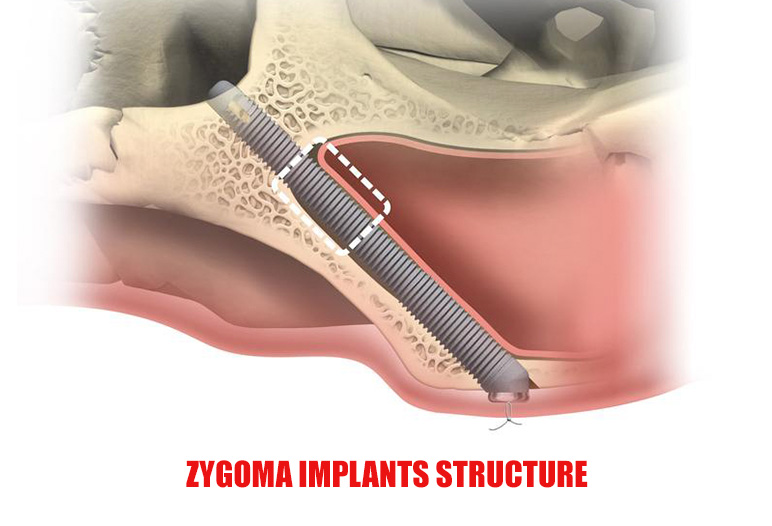
Why Choose Zygomatic Dental Implants?
Patients may choose zygomatic implants for several reasons. One key factor is the desire to avoid lengthy and invasive surgical procedures associated with traditional implants. Additionally, these implants can be placed in a single-session procedure, allowing patients to leave with immediate results.
Moreover, as mentioned earlier, zygomatic implants are an excellent solution for those who have faced obstacles preventing them from receiving regular implants. They enable patients to regain functionality and restore a natural-looking appearance without compromising their oral health.
Who is a Suitable Candidate for Zygomatic Implants?
Ideal candidates for zygomatic implants include individuals suffering from severe bone loss in the upper jaw who still possess generally good health. Factors such as smoking, chronic illnesses, or certain medications may influence candidacy and should be discussed with a dental professional prior to proceeding.
It’s essential to undergo a thorough evaluation, including imaging studies like CBCT (Cone-Beam Computed Tomography), to assess bone quality and determine if zygomatic implants are the right option. Consulting with a qualified oral surgeon is critical to ensuring a successful outcome tailored to individual needs.
Why are Zygomatic Implants Needed?
Dental implants are meant to replace missing teeth and restore oral function. However, when a patient has experienced significant bone loss, traditional implants may not suffice. In these situations, zygomatic dental implants become a necessary option.
Insufficient Bone Density
Insufficient bone density is a common problem faced by many individuals who have lost teeth over time. Natural bone resorption occurs after tooth loss, leading to weakened structures. Traditional implants require adequate bone volume for insertion; therefore, inadequate bone density can eliminate the possibility of using conventional implants.
Zygomatic implants address this challenge by relying on the zygomatic bone rather than the maxillary bone. The zygomatic bone maintains its density better than the upper jawbone, making it a reliable alternative for those with insufficient bone density.
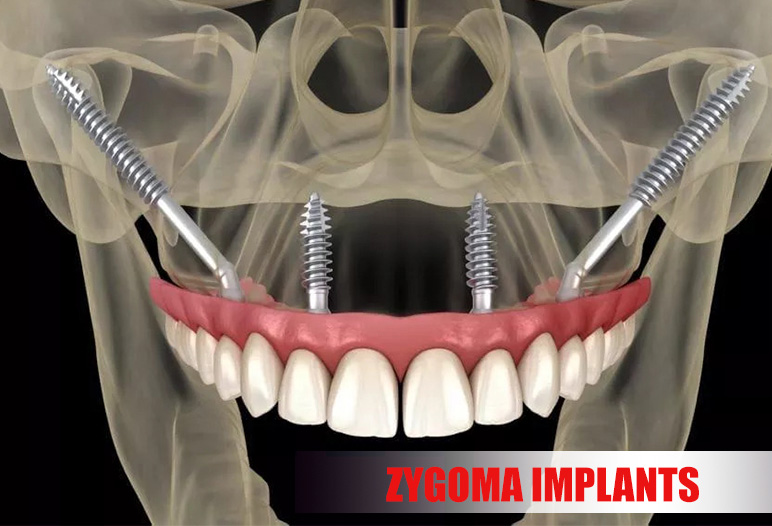
Severe Bone Loss
Severe bone loss can occur due to various reasons, including periodontal disease, trauma, or prolonged edentulism. When the upper jaw lacks adequate bone, patients experience challenges not only with aesthetics but also with eating and speaking.
In these circumstances, zygomatic implants present a viable solution. By anchoring into the zygomatic bone, they provide a firm base for restorations, enabling a full arch of teeth to be supported even in cases of significant bone deficiency.
Overcoming the Need for Bone Grafting
Traditionally, when a patient lacks sufficient bone volume, the standard course of action involves bone grafting to build up the area before placing implants. This process can be long, costly, and uncomfortable.
Zygomatic implants offer a way to bypass the extensive grafting process altogether. Patients can often receive their implants and temporary prosthetics in a single visit, thus minimizing discomfort and reducing the overall treatment timeline.
Benefits of Zygomatic Implants
Zygomatic implants provide numerous advantages for individuals seeking dental restoration, offering unique benefits that enhance both aesthetic and functional aspects of life.
Improved Quality of Life
Patients who receive zygomatic implants often express substantial improvements in their quality of life. The ability to eat, speak, and smile confidently can have profound effects on emotional well-being.
For many individuals, living with missing teeth or ill-fitting dentures can lead to social anxiety, embarrassment, or avoidance of outings. Zygomatic implants alleviate these concerns, allowing patients to enjoy their lives without the constant worry about their dental situation.
Enhanced Aesthetics
Aesthetics play a significant role in self-esteem and social interactions. Zygomatic implants can create a natural-looking smile and facial contour.
The positioning of zygomatic implants enables optimal placement for dental prosthetics, ensuring that replacements blend seamlessly with existing teeth. Patients can rediscover their youthful appearance with restored dental function and aesthetics.
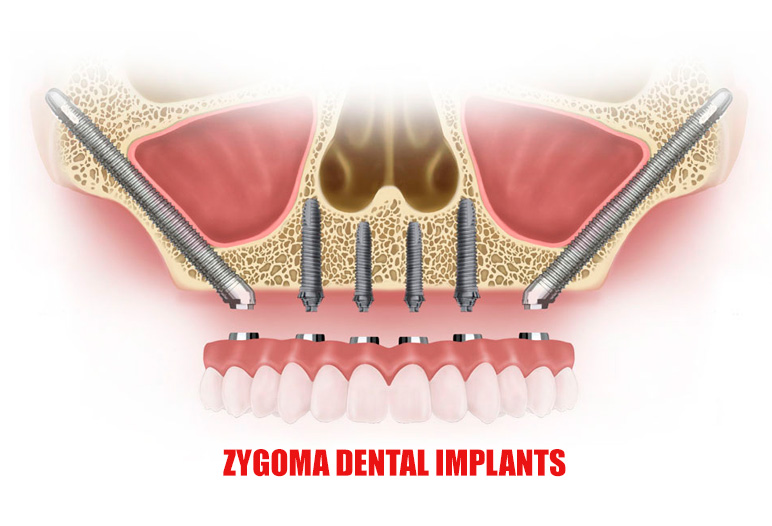
Long-lasting Solution
When properly cared for, zygomatic implants can last a lifetime. Their anchorage in the dense zygomatic bone provides stability and durability that often surpasses traditional dental implants.
With proper hygiene practices and regular check-ups, patients can expect their zygomatic implants to remain functional for years to come, making them a cost-effective option in the long run.
The Zygomatic Implant Procedure
Understanding the procedural steps involved in zygomatic implant placement empowers patients to prepare mentally and physically for their journey toward restoration.
Initial Consultation and Assessment
Before undergoing the zygomatic implant procedure, patients are required to attend an initial consultation with a qualified oral surgeon. This meeting typically involves a comprehensive examination to evaluate the patient’s oral health and suitability for zygomatic implants.
Imaging studies, such as X-rays or CT scans, will help the dentist visualize bone structure and identify the safest and most effective implant sites. An open dialogue about medical history, allergies, and existing health conditions will ensure the best possible outcome.
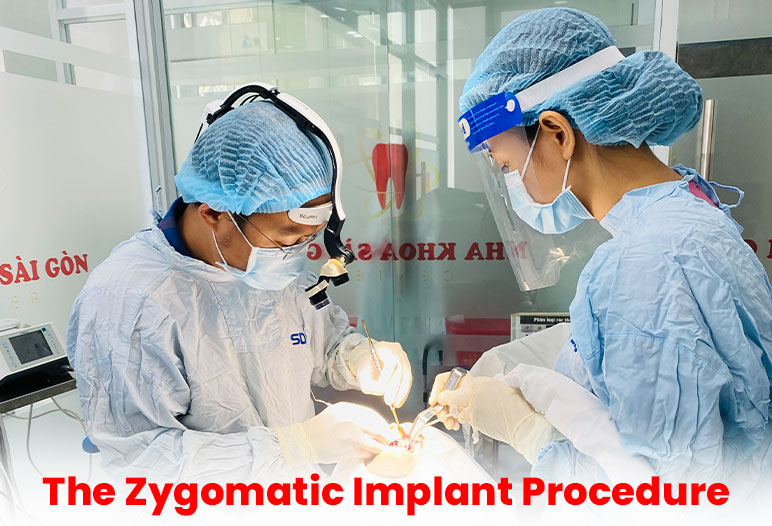
Surgical Procedure
Pre-operative
- Consultation: The patient will meet with their dentist or surgeon to discuss their options and determine if they are a good candidate for zygomatic implants.
- Imaging: The patient will have a CT scan or 3D scan of their jaw to assess the amount of bone available and plan the implant placement.
- Preparation: The patient will need to stop taking certain medications, such as blood thinners, before surgery.
Surgical Procedure
- Anesthesia: The patient will be given general anesthesia to ensure they are comfortable during the procedure.
- Incision: The surgeon will make an incision in the gum tissue along the upper jaw.
- Bone Exposure: The surgeon will lift the gum tissue to expose the bone.
- Drill Holes: The surgeon will use a drill to create holes in the zygomatic bone for the implants.
- Implant Placement: The surgeon will insert the implants into the holes and tighten them in place.
- Closure: The surgeon will suture the gum tissue closed.
Post-operative
- Recovery: The patient will be monitored in the recovery room for a few hours after surgery.
- Pain Management: The patient will be given pain medication to manage any discomfort.
- Swelling and Bruising: It is normal to experience some swelling and bruising around the surgical site.
- Follow-up: The patient will need to see their dentist or surgeon for follow-up appointments to monitor healing and make adjustments to the implants as needed.
Recovery and Healing Process
After the placement of zygomatic implants, the recovery period is crucial for the success of the procedure. Patients may experience some swelling, bruising, and discomfort following surgery, which can usually be managed with prescribed pain medication.
A follow-up appointment will be scheduled to monitor healing, assess implant stability, and begin discussing the prosthetic phase. Most patients can expect to return to regular activities within a few days, but complete healing may take several months depending on individual circumstances.
Types of Zygomatic Implants
There are various types of zygomatic implants available, each designed to meet specific needs and preferences. Understanding these options is critical for patients considering zygomatic implants.
All on 4 Zygomatic Implants
The All on 4 Zygomatic implant technique incorporates four implants – two zygomatic implants and two conventional implants placed in the anterior region of the jaw. This method supports a complete arch of prosthetic teeth while optimizing stability and aesthetic outcomes.
One of the main advantages of the All on 4 approach is the reduced need for bone grafts, allowing patients with insufficient bone density to benefit from the immediate loading of the prosthesis.
This system is particularly appealing to patients seeking a full-mouth restoration in a shorter timeframe. The design also minimizes the need for complex surgical procedures, streamlining the overall process.
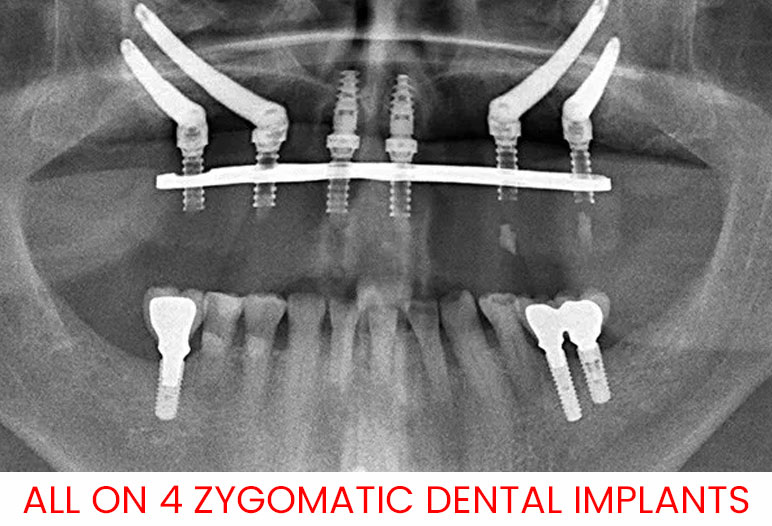
All on 4 Price at Saigon Center Dental Clinic:
| ALL ON 4 IMPLANTS | DENTAL IMPLANTS COST (USD) | DISCOUNT PRICE (USD) |
| Implant ALL ON 4 Dentium (Korea) (Include screw only + Temporary strengthened crown) | 5,600 | 4,000 |
| Implant ALL ON 4 Straumann Neodent (Swiss) (Include screw only + Temporary strengthened crown) | 6,400 | 5,200 |
| Implant ALL ON 4 Nobel / Straumann SLA Active (Include screw only + Temporary strengthened crown) | 8,800 | 7,200 |
| Final bar + High Acrylic Permanent teeth (4–6 Months Later) | 1,400 | |
| Final bar + Full Zirconia CAD/CAM teeth (4–6 Months Later) | 4,000 | |
| For patients deciding on Implants All-On treatment SAIGON CENTER DENTAL CLINIC will give customers a gift package, including: |
|
|
| Zygomatic Implants – “All on 4”, full arch, fixed bridge | 13,000 | |
Pterygoid Implants
Pterygoid dental implants are another innovative solution that works in tandem with zygomatic implants. These implants are placed in the pterygoid bone, located near the back of the upper jaw.
Including pterygoid implants can further enhance the support and stability of a prosthetic arch, particularly when zygomatic implants alone may not suffice. Together, they create a solid foundation that accommodates more extensive restorative procedures.
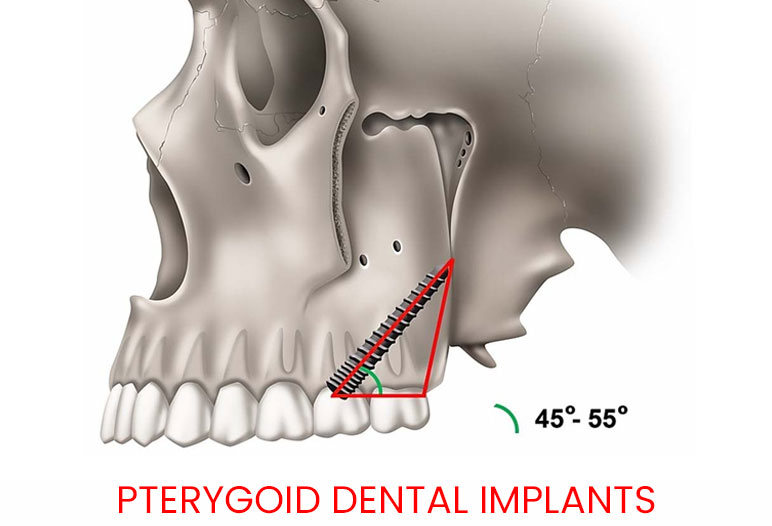
Quad Zygomatic Implants
Quad zygomatic implants involve placing four zygomatic implants—two on each side—to provide additional support for an upper arch denture. This technique is especially beneficial for patients facing extreme bone loss or rejections with conventional implants.
Quad zygomatic implants allow for immediate loading, giving patients a full set of teeth in just one day. The increased number of implants ensures enhanced stability and greater distribution of forces during chewing.
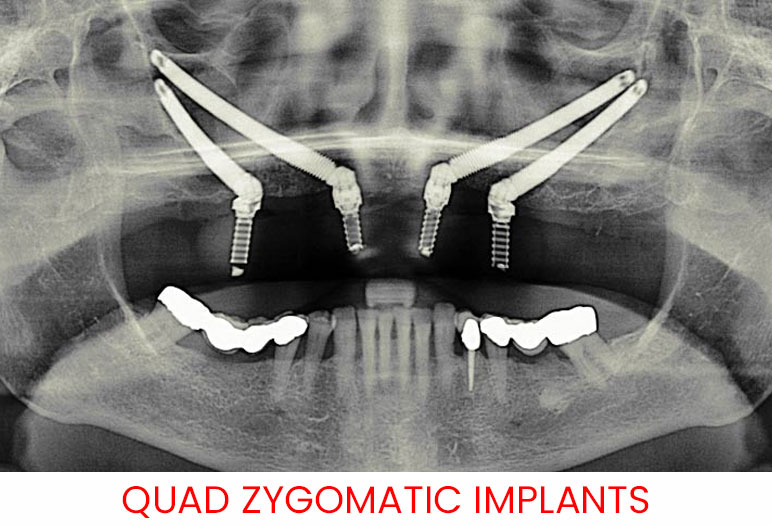
Nobel Biocare Zygomatic Implants
Nobel Biocare is a recognized leader in dental implant technology, offering a range of zygomatic implant options renowned for their quality and precision. These implants are designed to address specific anatomical considerations, ensuring optimal placement and long-term success.
Patients opting for Nobel zygomatic implants can expect innovations that prioritize comfort, aesthetics, and durability, thus enhancing their overall dental experience.
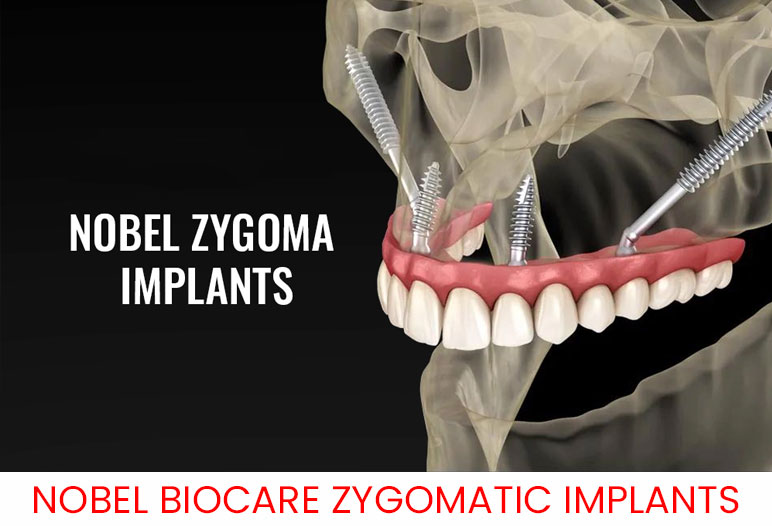
Cost of Zygomatic Dental Implants
Understanding the financial aspect of zygoma dental implants helps patients make informed decisions regarding their oral health.
Factors Affecting Costs
The cost of zygomatic dental implants can vary widely based on several factors, including:
- The complexity of the case
- The geographic location of the dental practice
- Additional procedures required (e.g., bone grafting, sinus lifts)
- The type of prosthesis selected
Patients should consult with their dental providers to obtain detailed estimates that encompass all associated expenses.
Insurance Coverage and Financing Options
Many insurance plans may cover part of the costs related to zygomatic implants. It is advisable to verify coverage details with insurance providers to understand what portion may be reimbursed.
Additionally, many dental offices offer financing options to spread out costs over time, thus making treatment more accessible for patients without compromising on quality.
Here is our implants all on + Zygomatic dental price at Saigon Center Dental Clinic:
| FULL-ARCH IMPLANTS | DENTAL COST (USD) | DISCOUNT PRICE (USD) |
| All-on-4 Dentium (incl. implants + reinforced provisional) | 5,600 | 4,000 |
| All-on-4 Straumann Neodent (incl. implants + reinforced provisional) | 6,400 | 5,200 |
| All-on-4 NOBEL / STRAUMANN SLA Active (incl. implants + reinforced provisional) | 8,800 | 7,200 |
| All-on-6 Dentium (incl. implants + reinforced provisional) | 7,600 | 5,600 |
| All-on-6 Straumann Neodent (incl. implants + reinforced provisional) | 8,400 | 7,600 |
| All-on-6 NOBEL / STRAUMANN SLA Active (incl. implants + reinforced provisional) | 12,000 | 10,400 |
| Zygomatic Implants – “All-on-4”, fixed full-arch bridge | 13,000 | |
| Titanium bar + premium acrylic teeth (final prosthesis after 4–6 months) | 1,400 | |
| Titanium bar + full-zirconia CAD/CAM teeth (final prosthesis after 4–6 months) | 4,000 | |
| SAIGON CENTER DENTAL CLINIC offers a bonus combo valued up to 400 for clients who decide to proceed with full-arch implants | ||
| Zygomatic Implants – “All on 4”, full arch, fixed bridge | 13,000 | |
Long-Term Value
While the initial investment in zygomatic implants may seem considerable, the long-term benefits can greatly outweigh the costs. With proper care, zygomatic dental implants can last a lifetime, reducing the likelihood of future restorative work or associated costs.
Investing in your smile through zygomatic implants is an investment in improved quality of life, functionality, and aesthetics.
Conclusion
In summary, zygomatic dental implants represent a groundbreaking solution for individuals struggling with severe bone loss in the upper jaw. By utilizing the zygomatic bone, these implants offer a stable and long-lasting foundation for dental prosthetics, overcoming the challenges posed by traditional implants.
The benefits of zygomatic implants extend beyond mere aesthetics; they play a pivotal role in enhancing the overall quality of life for patients. From improved confidence to the ability to enjoy favorite foods once again, zygomatic implants provide transformative results that empower individuals to reclaim their smiles.
As advancements in dental technologies continue to evolve, patients are encouraged to seek professional guidance, explore their options, and consider zygomatic implants as a viable path to restoring their dental health and happiness.



SAIGON CENTER DENTAL CLINIC
Best dentist in Vietnam
Our English-speaking team specializes in dental implants, teeth whitening, veneers, fillings, root canals, and pediatric care,... Trusted by locals and expats alike, we are known for being one of the best dentists in Ho Chi Minh City. Book an appointment today!"
SAIGON CENTER DENTAL CLINIC
Best dentist in Vietnam
Our English-speaking team specializes in dental implants, teeth whitening, veneers, fillings, root canals, and pediatric care,... Trusted by locals and expats alike, we are known for being one of the best dentists in Ho Chi Minh City. Book an appointment today!"